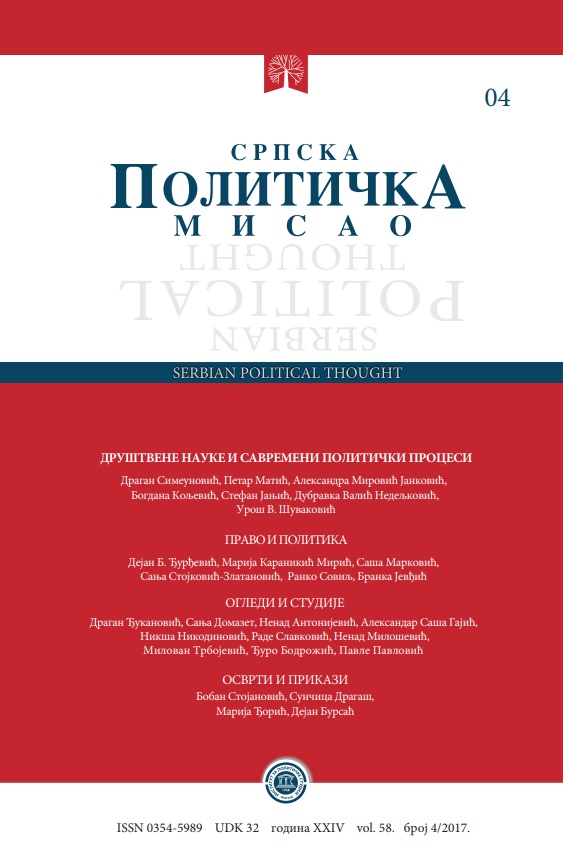Партијски ставови о Косову и Метохији у време парламентарних избора 2014. и 2016. године
Party Attitudes Regarding Kosovo and Metohija During Parliamentary Elections in 2014 and 2016
Author(s): Uroš V. ŠuvakovićSubject(s): Electoral systems
Published by: Институт за политичке студије
Keywords: Kosovo and Metohija; political parties in Serbia; evolution of program political attitudes; parliamentary election campaigns 2014 and 2016
Summary/Abstract: Political attitudes of main political parties in Serbia regarding the issue of Kosovo and Metohija (K&M) during the campaigns for the parliamentary elections in 2014 and 2016 are considered in the paper. The aim is to indicate changes in attitudes regarding this issue that happened after the recomposition of the political scene in Serbia after 2008, especially after the signing of the so-called Brussels Agreement in 2013. Implementing the method of content analysis of documents to program attitudes of political parties in Serbia or to “program speech” of their leaders during the election campaigns for the parliamentary elections in 2014 and 2016, the conclusion is that the issue of (K&M) is not treated uniformly anymore by Serbian political parties. It is possible to notice certain changes in program attitudes of the majority of political parties in Serbia. As long as the previous period is observed – the changes are bigger and more obvious. Parties of the independent block, ever since the middle of the first decade of this century, plead for the political attitude about the “amputation” of K&M from Serbia, while the DSS changed from 2008 its position from “both K&M and the EU” to “K&M in Serbia, Serbia out of the EU”. The DS changed its attitude regarding this issue from 2007 and through its programpolitical attitudes and even more through practical political movements (introduction of EULEX to K&M) in the direction of the independent policy. The Brussels Agreement, for which the leaders of the SNS and the SPS – Vučić and Dačić are primarily responsible, is the factor that partly homogenized political attitudes regarding K&M. The consent appeared in the political scene of Serbia between the parties from the block “Both K&M and the EU” and the parties from independent block regarding this agreement, so that the parties opposed to it are rather isolated, from the position of euroscepticism explained by the “defense of Kosovo” (DSS, SRS, Dveri). While the parties of the leading coalition still insist on the Resolution 1244 of the UNSC and declare that they will never recognize so-called Kosovo independence, the implementation of the so-called Brussels Agreement is going on in all of its elements, implying concessions of Serbia, its retreat, while establishment of the Community of Serb Municipalities has not happened even four years after the signing. Unlike the SNS that announced from establishment mutual “painful concessions” in the program “White Book”, the change of program attitudes brought by the socialists’ document “Vision of Serbia 2020” seems to be disorienting, containing the attitudes that might be the basis for at least three completely different solutions for the problem of K&M. Starting the so-called “internal dialogue about Kosovo”, the president Vučić actually has indicated that the issue of future politics of Serbia regarding the problem of K&M is still opened and has enabled that solutions are proposed in a democratic discussion that might be useful for its future formulation. It has become obvious that the politics “Both K&M and the EU” is less and less possible, but it is not clear if the politics “Either the EU or K&M” is possible at all. The answer to this question, apart from the participants in the public debate, probably will provide geopolitical measuring out of power between the Russia and the Western forces in the Balkans.
Journal: Српска политичка мисао
- Issue Year: 2017
- Issue No: 4
- Page Range: 85-104
- Page Count: 20
- Language: Serbian

